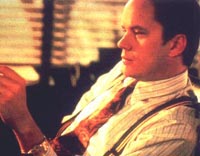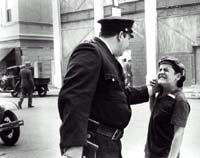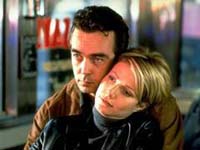
|
Top 50 Underappreciated Recent Films40) Dick
The Watergate scandal had many unexplained details, and Nixon's (the titular Dick) White House was chock-full of colorful personalities. That is what makes this movie work so well, as Dick seeks to fill in the details and tell the real story of Watergate. All the main players are represented: Tricky Dick, G. Gordon Liddy, Henry Kissinger, Haldeman and Dean, Woodward and Bernstein, Betsy and Arlene. Wuzza? Betsy and Arlene? Kirsten Dunst and Michelle Williams play high-schoolers Betsy and Arlene, who find themselves inadvertently in the middle of the botched burglary of Democratic National Party headquarters and its subsequent investigation, cover-up, and exposure, all leading up to the resignation of President Nixon. Along the way, we get to find out the answers to such questions as: How did the duct tape get on the door of the Watergate parking garage in the first place? What sensitive information was on the missing 18 minutes that were excised from the Nixon Tapes? What is the real identity of Woodward and Bernstein's informant Deep Throat? The movie is loads of fun and really deserved a better fate. Targeted squarely at the teen demographic, Dick would actually resonate better with older audiences more familiar with the true history of the time; a lot of the references no doubt went over my head but would be picked up by my parents. And therein lies the root cause of the disappointing box office: Know your audience and market to them. (Calvin Trager/BOP) 39) Chaplin
The main complaint of many critics - and myself - regarding this film has been that the movie focused too much on Chaplin's lifestyle, sex life, and exile in Switzerland, rather than his moviemaking genius. It would've been interesting to see Chaplin's meticulous attention to detail with the film production process more than we do. However, the main reason I chose this for being an overlooked film was the brilliant performances by several cast members. Robert Downey, Jr. is dazzling in the title role. He brings Chaplin to life from his early days in cinema through his appearance at the 1972 Academy Awards and on to old age. Downey was nominated for a Best Actor Oscar and won the Best Actor BAFTA, the British equivalent of the Academy Awards. Other wonderful performances come from Dan Aykroyd as Mack Sennett, Chaplin's first producer in America, and Geraldine Chaplin, portraying her own grandmother, Hannah. In the past, every time I heard about Downey having a run-in with the law, I was saddened because I knew what a talented actor he was. Hopefully, those days are behind him and we can get more performances such as this. (Marty Doskins/BOP) 38) The Player
--Robert Altman's love/hate relationship with the Hollywood world in which he must operate was cleverly turned into this masterpiece. It's a wonderful indictment of all the leeches and hangers-on who fraudulently pass themselves off as movie lovers in order to boost their self-esteem, all the while wrecking the work of those few savants who are blessed with actual Big Ideas. The story is told through the eyes of such a soulless suit, Griffin Mill. His world is one of power plays and ego strokes, but that all changes when the studio boss encounters a bitter writer with an ax to grind. What makes Mill so unique is that Altman doesn't force the man into a loathsome caricature but instead finds a way to make a completely selfish individual a hero as much as an anti-hero. We see him perform monstrous acts yet we still root for him to get the Hollywood Ending. It's this knowing wink at the way movie audiences behave which allows for Altman to mock his own climactic scene in the end. Of course, that's only the second most ingenious sequence in the film. The epic moment is a discussion of the longest and finest tracking shots in the history of movie making while Altman treats viewers to the best one in several decades. (David Mumpower/BOP) 37) King of the Hill
Based on the memoirs of A.E. Hotchner, it tells the story of a young boy growing up in St. Louis, Missouri during the Depression. The boy is Aaron Kurlander (Jesse Bradford), whose family has had to move into a hotel (the next step is homelessness) while his dad searches for a job. As his neighbors get evicted, his little brother is sent away to live with relatives, his mother is forced into a sanitarium, and his father sets off for a traveling salesman job, Aaron becomes more and more isolated. While this simple description sounds fairly depressing, the film tells the story through a child's eyes, where these adversities seem as much wonderful adventure as tragedy. Bradford is irrepressible as Aaron, and as bad things continue to happen, he responds with the resiliency that perhaps is found only in a child. Though he is awakened to the harsh realities of life, he manages to maintain a sense of innocence. The most miraculous thing about King of the Hill is its ability to avoid sentimentality. It would be very easy to go the mawkish route when dealing with a child facing adversity, but Soderbergh never takes the easy way out. The other wondrous quality of the film is its ability to be heartbreaking and uplifting in the same moment. When Aaron's father explains to Aaron about how he knew he was a smart baby, it is a perfect example of how a small, understated scene can reveal so much depth. Sadly, King of the Hill is not available on DVD and difficult to find on VHS, so it takes a little effort to see it, but it is certainly worth that effort. Hopefully continued Soderbergh success will trickle down to increased interest in his earlier works, and King of the Hill will receive a DVD release and the awareness it deserves. (Dan Krovich/BOP)
36) Sliding Doors
Where TV failed to address this very well, this gem of a movie does very well in showing the speculative in an interesting and plausible way. It starts out with a young woman (Gwyneth Paltrow with a good British accent) at an ad agency in London getting fired for getting into the office liquor, and the what-if-ing relates to whether or not she manages to catch a particular subway train on her way home. If she catches it, she's home way early and finds her live-in leech of a boyfriend in bed with another woman. If not, the "other woman" has a chance to get away and she's none the wiser. The rest of the movie more-or-less sequentially follows these two tracks forward, seeing what sort (and how much) of a new start she makes for herself. In the dump-the-cheating-swine track, she radically cuts her hair early on, so you can easily tell which track you're watching from where her hair is. Plot-wise, the film is uneven; there's stuff that is terribly manufactured, and the cheating-swine boyfriend (in the universe where she didn't catch him) has to deal with a great deal of clumsy, contrived situations as he tries to juggle both women (not very well). But Paltrow is fantastic here; she and John Hannah (who plays a romantic interest that she picks up along the way) give great performances that are very true, very believable, and when they sweat and struggle with life, you end up loudly rooting for them to win out. And in the end, that's the heart of good romantic comedy for me; you end up liking and rooting for the protagonists, wishing them well, and hoping like hell for them to get past whatever life - or the script - throws at them together. Happily. And in that sense, Sliding Doors pays off well. (Jim Rittenhouse/BOP)
Click here to read selections 50-46.
|
Saturday, April 26, 2025
© 2006 Box Office Prophets, a division of One Of Us, Inc.
 What do you get when you take All The President's Men and cross it with
Forrest Gump's central conceit of placing fictional characters in a
historical context? You get this very funny, very original comedy, which was
tragically lost in 1999's summer shuffle and made only $6.2 million at the
box office. To date, it has made less than $17 million through rental
outlets.
What do you get when you take All The President's Men and cross it with
Forrest Gump's central conceit of placing fictional characters in a
historical context? You get this very funny, very original comedy, which was
tragically lost in 1999's summer shuffle and made only $6.2 million at the
box office. To date, it has made less than $17 million through rental
outlets.
 This movie biography tells the story of legendary comedian Charlie Chaplin
(who else?). The film was based on Chaplin's autobiography. The story is
told in a series of flashbacks. Sir Anthony Hopkins plays George Hayden,
the editor of Chaplin's book, who is interviewing Chaplin trying to fill in
some missing information.
This movie biography tells the story of legendary comedian Charlie Chaplin
(who else?). The film was based on Chaplin's autobiography. The story is
told in a series of flashbacks. Sir Anthony Hopkins plays George Hayden,
the editor of Chaplin's book, who is interviewing Chaplin trying to fill in
some missing information.
 --The movie that put Robert Altman back on the map, The Player is a funny,
searing portrayal of the business of Hollywood. Tim Robbins is Griffin
Mill, a studio exec whose life, both personally and professionally, begins
to unravel as he is finds himself blackmailed by a screenwriter. In typical
Altman style, The Player has a sprawling cast and divergent storylines which
all come together in the end. You don't need to be a Hollywood insider to
appreciate Altman's black comedy; the characters he introduces are
accessible to even those Midwesterners his Mill and his ilk seem to hold in
such contempt, even as they attempt to entertain them. That being said, the
movie contains a few "inside" jokes which probably are funnier to industry
types. The opening scene, a one-camera, no-cut tracking shot, is worth the
price of admission, and the last scene, with its surprise cameos, is
hilarious. This film certainly wasn't underappreciated by the critics; The
Player garnered Altman some of his best reviews, a Best Director nod from
the Academy and the Best Director award at the 1992 Cannes Film Festival.
However, The Player never did find a mass audience, which is a shame, as it
is definitely one of Altman's most enjoyable and accessible pieces of work.
(Stephanie DeGateo/BOP)
--The movie that put Robert Altman back on the map, The Player is a funny,
searing portrayal of the business of Hollywood. Tim Robbins is Griffin
Mill, a studio exec whose life, both personally and professionally, begins
to unravel as he is finds himself blackmailed by a screenwriter. In typical
Altman style, The Player has a sprawling cast and divergent storylines which
all come together in the end. You don't need to be a Hollywood insider to
appreciate Altman's black comedy; the characters he introduces are
accessible to even those Midwesterners his Mill and his ilk seem to hold in
such contempt, even as they attempt to entertain them. That being said, the
movie contains a few "inside" jokes which probably are funnier to industry
types. The opening scene, a one-camera, no-cut tracking shot, is worth the
price of admission, and the last scene, with its surprise cameos, is
hilarious. This film certainly wasn't underappreciated by the critics; The
Player garnered Altman some of his best reviews, a Best Director nod from
the Academy and the Best Director award at the 1992 Cannes Film Festival.
However, The Player never did find a mass audience, which is a shame, as it
is definitely one of Altman's most enjoyable and accessible pieces of work.
(Stephanie DeGateo/BOP)
 Steven Soderbergh has been one of the most successful directors of the past
few years, but between his breakthrough debut with sex, lies, and videotape
and his recent resurgence, he made several box office flops. Some of those
were rather idiosyncratic and experimental, so it's not all that surprising
that they fared poorly. King of the Hill, on the other hand, is very
accessible, and this charming and extraordinary, bittersweet coming-of-age
tale certainly deserved a better fate.
Steven Soderbergh has been one of the most successful directors of the past
few years, but between his breakthrough debut with sex, lies, and videotape
and his recent resurgence, he made several box office flops. Some of those
were rather idiosyncratic and experimental, so it's not all that surprising
that they fared poorly. King of the Hill, on the other hand, is very
accessible, and this charming and extraordinary, bittersweet coming-of-age
tale certainly deserved a better fate.
 Alternate history is a big thing in literature these days, and two (failed)
series on TV this fall tried to take this idea to the personal level: What
if I had done X rather than Y at a particular time, how would that have
changed my life or those of my friends and acquaintances?
Alternate history is a big thing in literature these days, and two (failed)
series on TV this fall tried to take this idea to the personal level: What
if I had done X rather than Y at a particular time, how would that have
changed my life or those of my friends and acquaintances?